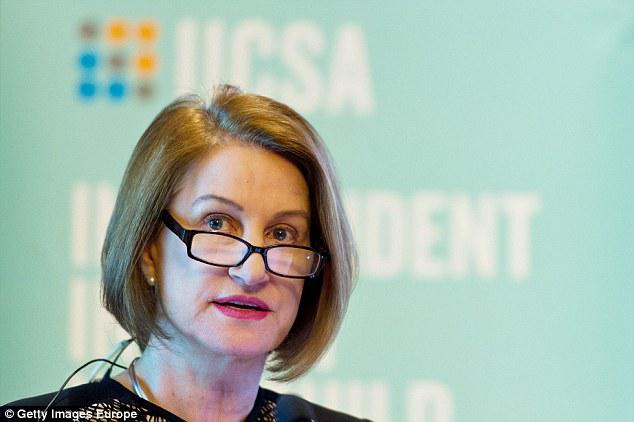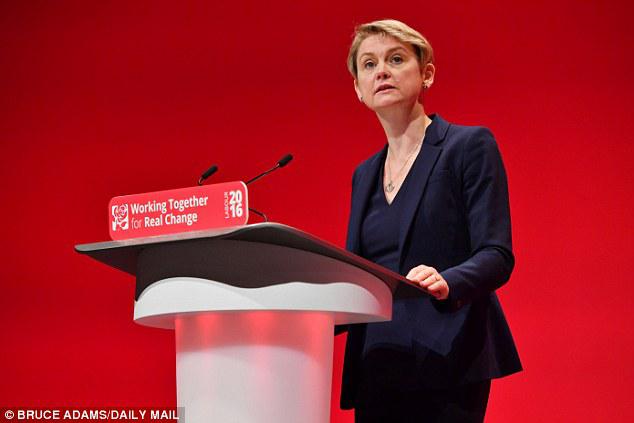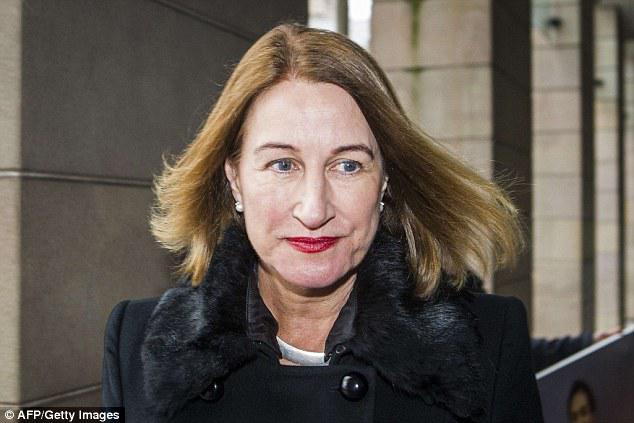|
Opponents of the child abuse inquiry wanted to deal it a 'fatal' blow by forcing me out, ex-chairwoman Dame Lowell Goddard claims - but she REFUSES to let MPs cross examine her
By Tim Sculthorpe
Daily Mail
November 2, 2016
https://goo.gl/41ztzh
 |
| Dame Lowell Goddard has refused to appear before MPs to explain her shock resignation in person, insisting she cab better explain her position in writing |
 |
| Home Affairs committee chairwoman Yvette Cooper has urged Dame Lowell to give evidence in person to the cross-party committee, to allow MPs to cross examine her |
 |
| Dame Lowell dismissed criticisms of her trips to New Zealand and Australia during her 18-month chairmanship, insisting that she was authorised and equipped to 'work remotely' and remained in contact with the inquiry at all times |
[with video]
The ex-head of the Child Sexual Abuse Inquiry has blamed a 'relentless' media 'campaign' for undermining confidence in her leadership and forcing her to quit.
Dame Lowell Goddard has refused to appear before MPs to explain her shock resignation in person, insisting she cab better explain her position in writing.
The New Zealand judge told MPs she believed campaigners published articles in the press in the hope of dealing a 'fatal' blow to the inquiry by forcing her to become the third head to resign the post.
In an eight-page written submission to the House of Commons Home Affairs Select Committee (HASC), the New Zealand judge acknowledged there were 'tensions' within the inquiry team.
But amid allegations of a string of concerns about her conduct before she resigned, the judge today insisted that concerns about the quality of her leadership were never raised with her.
HASC chairwoman Yvette Cooper urged Dame Lowell to give evidence in person to the cross-party committee, to allow MPs to put 'precise and specific questions' to her.
Ms Cooper rejected the judge's argument that it was more 'effective' for her to detail her experiences in writing, insisting that oral evidence - if necessary by video link from New Zealand - was 'essential'.
Ms Cooper also rebuffed a plea from Dame Lowell's successor Alexis Jay for the committee to 'consider carefully' before calling any more members of the inquiry to give evidence.
Prof Jay warned it was 'vital' for the inquiry to concentrate on its work and maintain its independence, but Ms Cooper retorted in a letter: 'It will be for the committee to decide when and whom to call on to give further evidence.'
The Labour MP told Prof Jay: 'Given the two-year history of problems in the inquiry, it is vitally important that there is some transparency over the things that have gone wrong in the past, and the way it is working now, so people can have confidence that problems are now resolved and the work is back on track.'
In a submission sent to the committee on October 28, Dame Lowell complained she had been the victim of 'extensive, false and defamatory' media comment since her resignation, including remarks attributed to anonymous members of the HASC.
She urged Ms Cooper to investigate the 'leak of false information' from the committee to the press and warned that it would be 'unjust ... and prejudicial to me' if any of the allegations were repeated under cover of parliamentary privilege.
Dame Lowell also dismissed criticisms of her trips to New Zealand and Australia during her 18-month chairmanship, insisting that she was authorised and equipped to 'work remotely' and remained in contact with the inquiry at all times
Explaining the background to her resignation, Dame Lowell said the inquiry had been subject to 'real and increasing strain' since March from 'intensifying' media criticism.
This centred on claims of unfairness in the investigation of allegations against late Labour peer Lord Janner and 'developed into widening personal attacks on me and my competence', including reports about her extended absence overseas, she said.
By late July, the reports had had 'a damaging internal impact on the inquiry and me', said Dame Lowell, adding: 'I believe this is when the team lost their nerve about my ability to continue leading the inquiry, which I perceived to be the objective of those behind the publications.
'I considered both the impact of this campaign and the effect which I saw it to have. The allegations were false but they had already done their damage.
'I nevertheless believed that, having made the commitment to the victims and survivors, I had to continue to see it through.
'I was also very concerned that if the inquiry lost a third chair that might prove fatal for it, which was clearly what the campaigners were seeking to achieve.
'The pressure was relentless, as was the impact on panel members and all who felt deeply their responsibility to the inquiry.'
It was only after three members of the inquiry's panel came to see her on August 4 and made clear she no longer had the support of senior colleagues that she decided to quit.
Dame Lowell insisted that the decision to resign was hers alone, adding: 'There was no contact with the Home Secretary or the Home Office before I made my decision and no earlier pressure either.'
She said she regarded the decision as 'right', but she regretted not calling Home Secretary Amber Rudd personally to tender her resignation.
She said a panel member had later confirmed that the team's 'loss of confidence in my leadership' had been prompted by adverse press commentary on her performance at a preliminary hearing into Lord Janner's case on July 26. But she insisted she did not regard the criticism as 'justified'.
She added: 'I categorically deny that there was any basis for any allegation of misconduct raised, or causing, or connected to my resignation.'
Dame Lowell said she had been aware of 'natural tensions' within the Independent Inquiry into Child Sexual Abuse (IICSA) before the August 4 meeting, but believed that they were 'not serious'.
She acknowledged that her management of the inquiry had caused 'discomfort' among members of the inquiry's expert panel - who wanted to be involved in legal, procedural and managerial decisions which she believed were for her alone.
A meeting called in March to bring panel members to 'a better understanding of their role' resulted in 'heated' discussions about the inquiry's spending and management of legal work, she said.
But she insisted that the meeting - which she did not attend - was 'successful', and denied suggestions that an external facilitator had been called in to improve her working relationship with the panel.
Dame Lowell insisted that she had 'the apparent support, both given and expressed' of the panel throughout her chairmanship, and said that members agreed that attacks on her were 'aimed at undermining me for the wider purpose of undermining the inquiry itself'.
No questions about the quality of her leadership were ever raised by inquiry secretary John O'Brien, she said, adding; 'At no time did he ever raise with me any matter of complaint or concern about my relationship with any staff member or about my conduct.'
Panel member Drusilla Sharpling arranged to meet a senior Home Office official in April to have 'a quiet word' about operational problems at the inquiry, said Dame Lowell. But she said she was 'certain' that no complaints about her leadership were raised at the meeting, as these would have to have been escalated to the Home Office's permanent secretary Mark Sedwill.
Dame Lowell dismissed criticisms of her trips to New Zealand and Australia during her 18-month chairmanship, insisting that she was authorised and equipped to 'work remotely' and remained in contact with the inquiry at all times.
|


